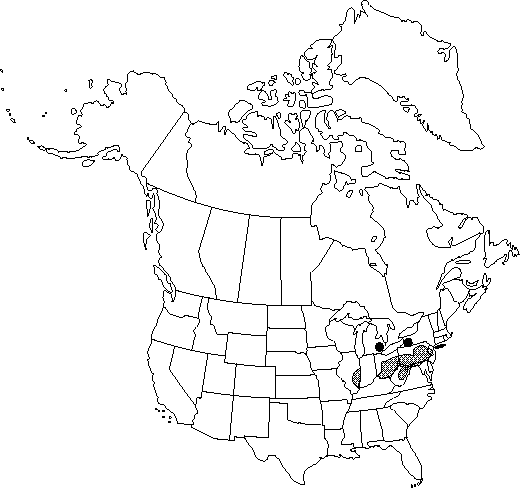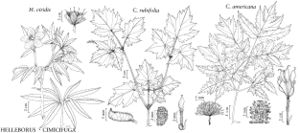Difference between revisions of "Helleborus viridis"
Sp. Pl. 1: 557. 1753.
FNA>Volume Importer |
imported>Volume Importer |
||
| (7 intermediate revisions by 2 users not shown) | |||
| Line 10: | Line 10: | ||
|special_status={{Treatment/ID/Special_status | |special_status={{Treatment/ID/Special_status | ||
|code=F | |code=F | ||
| − | |label= | + | |label=Illustrated |
}}{{Treatment/ID/Special_status | }}{{Treatment/ID/Special_status | ||
|code=I | |code=I | ||
| Line 24: | Line 24: | ||
}}<!-- | }}<!-- | ||
| − | --><span class="statement" id="st- | + | --><span class="statement" id="st-undefined" data-properties=""><b>Herbs,</b> 1.2-3.5 dm. <b>Stems</b> fluted and ridged. <b>Leaves</b> 2-5 or more; basal leaves with petioles to 30cm; blades to 40cm wide, lobes 6-15, 2-cleft or incised, 6-21 × 1.5-4.2 cm, margins sharply serrate; cauline leaves similar to basal but smaller, sessile or short-petioled. <b>Inflorescences</b>: peduncles 2-5 cm. <b>Flowers</b> pendent, 35-60 mm diam.; sepals scarcely imbricate, 9-20 mm wide; petals upwardly curved, cornucopia-like with involute margins. <b>Follicles</b> 3-6, connate at base, swollen; body 14-25 mm; beak persistent.</span><!-- |
-->{{Treatment/Body | -->{{Treatment/Body | ||
| Line 30: | Line 30: | ||
|habitat=Waste places, abandoned gardens, shaded roadsides, and calcareous woodlands | |habitat=Waste places, abandoned gardens, shaded roadsides, and calcareous woodlands | ||
|elevation=0-400m | |elevation=0-400m | ||
| − | |distribution=Ill.;Md.;Mich.;N.J.;N.Y.;Ohio;Pa.;W.Va.;Europe | + | |distribution=Ill.;Md.;Mich.;N.J.;N.Y.;Ohio;Pa.;W.Va.;Europe. |
| + | |introduced=true | ||
|discussion=<p>This species is not as commonly planted as it once was, and most records are old.</p> | |discussion=<p>This species is not as commonly planted as it once was, and most records are old.</p> | ||
|tables= | |tables= | ||
| Line 40: | Line 41: | ||
-->{{#Taxon: | -->{{#Taxon: | ||
name=Helleborus viridis | name=Helleborus viridis | ||
| − | |||
|authority=Linnaeus | |authority=Linnaeus | ||
|rank=species | |rank=species | ||
| Line 50: | Line 50: | ||
|habitat=Waste places, abandoned gardens, shaded roadsides, and calcareous woodlands | |habitat=Waste places, abandoned gardens, shaded roadsides, and calcareous woodlands | ||
|elevation=0-400m | |elevation=0-400m | ||
| − | |distribution=Ill.;Md.;Mich.;N.J.;N.Y.;Ohio;Pa.;W.Va.;Europe | + | |distribution=Ill.;Md.;Mich.;N.J.;N.Y.;Ohio;Pa.;W.Va.;Europe. |
|introduced=true | |introduced=true | ||
|reference=None | |reference=None | ||
|publication title=Sp. Pl. | |publication title=Sp. Pl. | ||
|publication year=1753 | |publication year=1753 | ||
| − | |special status= | + | |special status=Illustrated;Introduced |
| − | |source xml=https:// | + | |source xml=https://bitbucket.org/aafc-mbb/fna-data-curation/src/2e0870ddd59836b60bcf96646a41e87ea5a5943a/coarse_grained_fna_xml/V3/V3_639.xml |
|genus=Helleborus | |genus=Helleborus | ||
|species=Helleborus viridis | |species=Helleborus viridis | ||
| − | |||
| − | |||
| − | |||
| − | |||
| − | |||
| − | |||
| − | |||
| − | |||
| − | |||
| − | |||
| − | |||
| − | |||
| − | |||
| − | |||
| − | |||
| − | |||
| − | |||
| − | |||
| − | |||
| − | |||
| − | |||
| − | |||
| − | |||
| − | |||
| − | |||
}}<!-- | }}<!-- | ||
-->[[Category:Treatment]][[Category:Helleborus]] | -->[[Category:Treatment]][[Category:Helleborus]] | ||
Latest revision as of 21:50, 5 November 2020
Herbs, 1.2-3.5 dm. Stems fluted and ridged. Leaves 2-5 or more; basal leaves with petioles to 30cm; blades to 40cm wide, lobes 6-15, 2-cleft or incised, 6-21 × 1.5-4.2 cm, margins sharply serrate; cauline leaves similar to basal but smaller, sessile or short-petioled. Inflorescences: peduncles 2-5 cm. Flowers pendent, 35-60 mm diam.; sepals scarcely imbricate, 9-20 mm wide; petals upwardly curved, cornucopia-like with involute margins. Follicles 3-6, connate at base, swollen; body 14-25 mm; beak persistent.
Phenology: Flowering winter–early spring (Dec–Mar).
Habitat: Waste places, abandoned gardens, shaded roadsides, and calcareous woodlands
Elevation: 0-400m
Distribution

Introduced; Ill., Md., Mich., N.J., N.Y., Ohio, Pa., W.Va., Europe.
Discussion
This species is not as commonly planted as it once was, and most records are old.
Selected References
None.
Lower Taxa
None.
